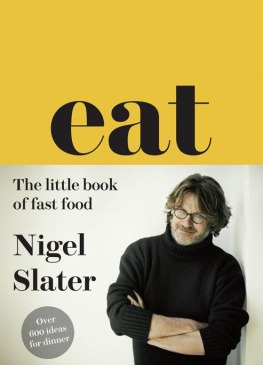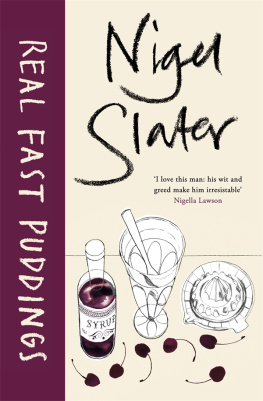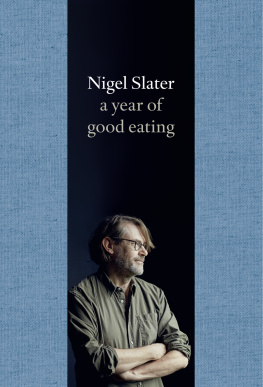Nigel Slater - The Kitchen Diaries
Here you can read online Nigel Slater - The Kitchen Diaries full text of the book (entire story) in english for free. Download pdf and epub, get meaning, cover and reviews about this ebook. year: 2006, publisher: Fourth Estate Ltd, genre: Home and family. Description of the work, (preface) as well as reviews are available. Best literature library LitArk.com created for fans of good reading and offers a wide selection of genres:
Romance novel
Science fiction
Adventure
Detective
Science
History
Home and family
Prose
Art
Politics
Computer
Non-fiction
Religion
Business
Children
Humor
Choose a favorite category and find really read worthwhile books. Enjoy immersion in the world of imagination, feel the emotions of the characters or learn something new for yourself, make an fascinating discovery.
- Book:The Kitchen Diaries
- Author:
- Publisher:Fourth Estate Ltd
- Genre:
- Year:2006
- Rating:4 / 5
- Favourites:Add to favourites
- Your mark:
- 80
- 1
- 2
- 3
- 4
- 5
The Kitchen Diaries: summary, description and annotation
We offer to read an annotation, description, summary or preface (depends on what the author of the book "The Kitchen Diaries" wrote himself). If you haven't found the necessary information about the book — write in the comments, we will try to find it.
The Kitchen Diaries — read online for free the complete book (whole text) full work
Below is the text of the book, divided by pages. System saving the place of the last page read, allows you to conveniently read the book "The Kitchen Diaries" online for free, without having to search again every time where you left off. Put a bookmark, and you can go to the page where you finished reading at any time.
Font size:
Interval:
Bookmark:
Nigel Slater is the author of a collection of bestselling books and presenter of BBC Is Simple Cooking and Dish of the Day . He has been food columnist for the Observer for twenty years. His books include the classics Appetite and The Kitchen Diaries and the critically acclaimed two-volume Tender . His award-winning memoir Toast the story of a boys hunger won six major awards and is now a BBC film starring Helena Bonham Carter and Freddie Highmore. His writing has won the National Book Award, the Glenfiddich Trophy, the Andr Simon Memorial Prize and the British Biography of the Year. He was the winner of a Guild of Food Writers Award for his BBC I series Simple Suppers .
Also by Nigel Slater
The Kitchen Diaries II
Tender Volumes I and II
Eating for England
The Kitchen Diaries
Toast the story of a boys hunger
Thirst
Appetite
Nigel Slaters Real Food
Real Cooking
The 30-Minute Cook
Real Fast Food
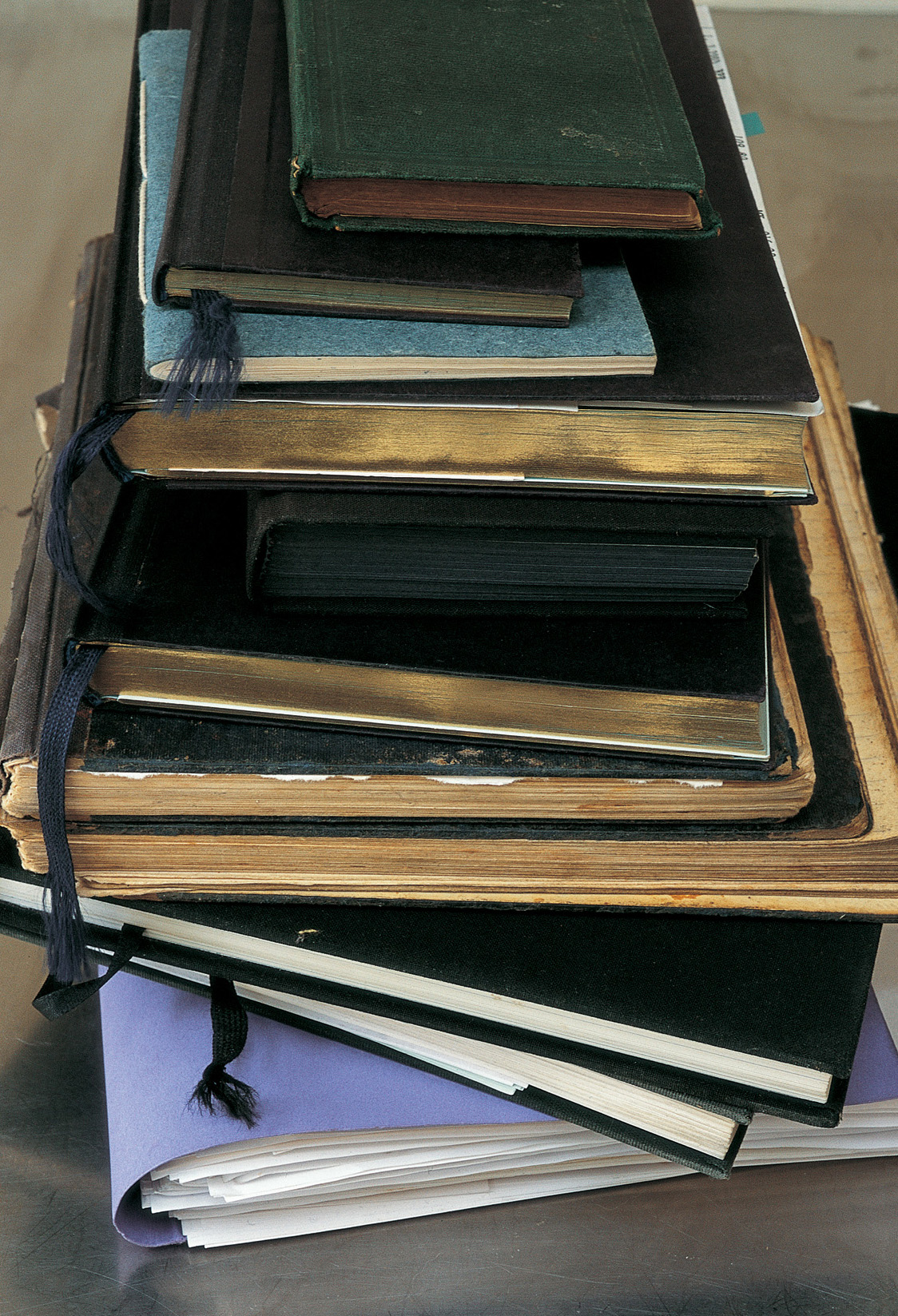
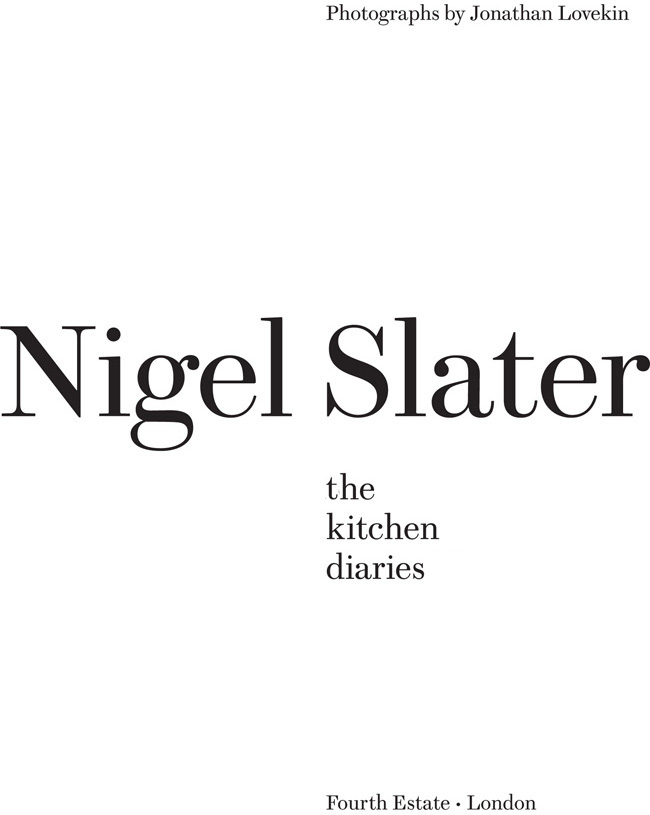
To Digger, Magrath and Poppy
And to Louise and Jonnie with love
With thanks to Sam Blok, Araminta Whitley,
Allan Jenkins,Nung Puinongpho,
Jane Middleton, Silvia Crompton, and to Rohan and Sophie,
and everyone at 4th Estate
Right food, right place, right time. It is my belief and the point of this book that this is the best recipe of all. A crab sandwich by the sea on a June afternoon; a slice of roast goose with apple sauce and roast potatoes on Christmas Day; hot sausages and a chunk of roast pumpkin on a frost-sparkling night in November. These are meals whose success relies not on the expertise of the cook but on the more basic premise that this is the food of the moment something eaten at a time when it is most appropriate, when the ingredients are at their peak of perfection, when the food, the cook and the time of year are at one with each other.
There is something deeply, unshakeably right about eating food in season: fresh runner beans in July, grilled sardines on a blisteringly hot August evening, a bowl of gently aromatic stew on a rainy day in February. Yes, it is about the quality of the ingredients too, their provenance and the way they are cooked, but the very best eating is also about the feeling that the time is right.
I do believe, for instance, that a cold Saturday in January is a good time to make gingerbread. It is when I made it and we had a good time with it. It felt right. So I offer it to you as a suggestion, just as I offer a cheesecake at Easter, a curry for a cold night in April and a pale gooseberry fool for a June afternoon. It is about seasonality, certainly, but also about going with the flow, cooking with the natural rhythm of the earth.
Learning to eat with the ebb and flow of the seasons is the single thing that has made my eating more enjoyable. Our culinary seasons have been blurred by commerce, and in particular by the supermarkets much vaunted idea that consumers want all things to be available all year round. I dont believe this is true. I have honestly never met anyone who wants to eat a slice of watermelon on a cold March evening, or a plate of asparagus in January. It is a myth put about by the giant supermarkets. I worry that today it is all too easy to lose sight of foods natural timing and, worse, to miss it when it is at its sublime best. Hence my attempt at writing a book about rebuilding a cooks relationship with nature.
I wanted to know exactly when I might find something at its glorious, juicy, sweetly flavoured peak. If something is to be truly, remarkably good to eat, then isnt it worth knowing precisely when that moment might be? Spring or autumn has always been too vague for me. There is a vast difference between winter-spring and summer-spring. Even labelling raw ingredients by the month in which they are due to ripen is a bit hit and miss (I missed the damsons and the greengages one year relying on that premise). Anyone who has gone to a farmers market in the first week of May and again in the last week will know where I am coming from. It is like two completely different months.
That said, this is not a book whose dates are to be followed like a mantra. It is simply a book of suggestions for when you might, should you care to look, find gooseberries, sprouts, damsons etc. at their best. It is a guide to what is and isnt worth eating and when. And I like to think that there are few things more worth knowing than that. It is not some tyrannical culinary calendar but a book to dip in and out of throughout the year and the years to come, a reminder to keep an eye out for something, a gentle and, I hope, delicious aide-mmoire.
photographs
The photography has been done in real time. So when it says October 2nd or April 9th, then that is when the picture was shot. After I have cooked each meal and it has been photographed, we sit down and eat it while it is still hot. Then I wash up. The pictures are taken at home, so if you recognise plates and pans from my books Real Food or Appetite, then that is because they are things that I have come to love and cherish. Whether its a vegetable peeler or a palette knife, it works for me and has become part of my life.
For the most part I shop at small local shops, farmers markets, proper butchers, fishmongers, delicatessens and cheese shops rather than all at once on a weekly trip to a supermarket. I have honestly never set foot inside a branch of Tesco. This book is very much a gentle plea to buy something, however small, each day, to take time to shop, to treat it as a pleasure rather than a chore. This doesnt mean I spend my life shopping, far from it. It simply means that I stock up on dry goods, such as rice, pasta and the like, once a week, then manage to find half an hour a day (sometimes less) to buy just one or two fresh things from someone who sells them with a passion and a specialist interest easier than ever now that shops tend to stay open later.
A weekly trip to the farmers market forms the backbone of my fresh food shopping, plus I have a weekly organic box delivered to my door. I love to see those tables laid out under striped awnings with food that is being sold by the people who made or picked it. Shopping at the farmers market means that you can buy your cream from the person who churned it, your potatoes directly from the people who dug them from the ground, your salad leaves from the guy who planted the seeds. Food with a story you can follow from seed packet to table, picked that day. This, to me, is as good as food shopping gets.
I feel that buying ingredients as fresh, as honest as this is a chance to cook them as simply as possible, to let the food taste of itself, to allow it to be what it is.
My kitchen is not large, but a trio of skylights and the fact that the doors open up to the garden make it a hugely pleasurable place in which to cook. It has no fancy cookers, no batterie of expensive equipment, yet it has been thoughtfully and intelligently designed. The space works perfectly. Good kitchens are not about size, they are about ergonomics and light.
My garden is a tiny urban space, yet it has been crucial to this book. Leading down from the kitchen doors are steps on which rest pots of thyme and single marigolds, dark red pelargoniums and Italian aubergines. There is an old stone terrace where we eat in summer round a zinc-topped table set under a fig tree. The terrace makes way for a small, rather amateurish potager, with six little beds filled to overflowing. Two for pot-herbs, roses and old-fashioned scented pinks, one each for raspberries and currants, another for tomatoes and courgettes and one for runner beans, broad beans, artichokes and rhubarb. In amongst the chaos grow sweet peas, dahlias, nasturtiums and opium poppies.
Next pageFont size:
Interval:
Bookmark:
Similar books «The Kitchen Diaries»
Look at similar books to The Kitchen Diaries. We have selected literature similar in name and meaning in the hope of providing readers with more options to find new, interesting, not yet read works.
Discussion, reviews of the book The Kitchen Diaries and just readers' own opinions. Leave your comments, write what you think about the work, its meaning or the main characters. Specify what exactly you liked and what you didn't like, and why you think so.

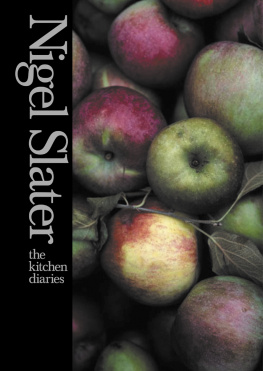
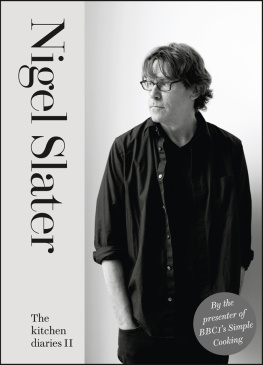
![Nigel Slater - A Cooks Book: The Essential Nigel Slater [A Cookbook]](/uploads/posts/book/441033/thumbs/nigel-slater-a-cook-s-book-the-essential-nigel.jpg)
